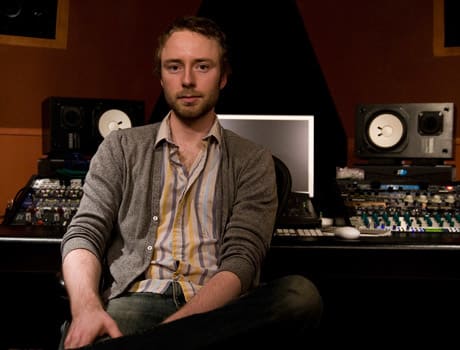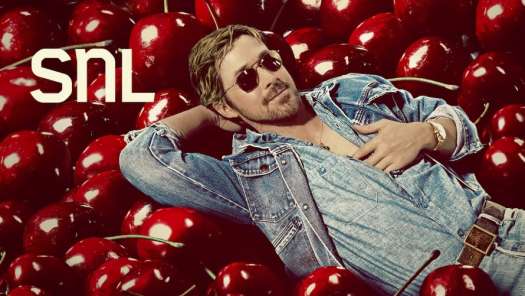Located in Vancouver producer Tom Dobrzanski's basement apartment, Vertical Studios doesn't look like your typical indie-rocker hangout. The place is void of that familiar cigarettes-and-sweat aroma. There are no mud-chunked Converse sneakers kicking around. No half-empty beer cans stuck to the floor. No guitars, amps, or cords flung carelessly to the side. Instead, the multi-instrumentalist and Zolas band member boasts a corporate-looking living area worthy of Trump Towers. And down the hall, where Vertical Studios should be territorially marked with blood and strings, bands are met with what resembles a top-of-the-line, big-money production space.
Vertical Studios consists of five small, acoustically isolated rooms ― a control room, live room, vocal isolation booth and two amp isolation rooms ― that are clean and minimally decorated, making the space feel open and professional. The control area gleams and sparkles, as if someone polishes the flooring and decorative panelling on a regular basis. It smells of fresh wood, genuine leather and fancy musical gadgets. The production station faces one wall, while a vintage Wurlitzer sits flush to his right and black leather couches snuggle in the far corner. At the back, geometric wooden panelling diffuses acoustic energy to allow for natural-sounding playbacks.
Although Vertical Studios appears too swanky for the average fledgling band, it actually reflects a new-age indie consciousness. Dobrzanski began building Vertical Studios (named after his first university band Vertical Smile) in 2005, and during the construction process, ensured soundproof separation between each of the spaces. Like the sleek design of the studio, the segregated floor plan reflects Dobrzanski's personal philosophy, which is to guarantee precise audio isolation for overdubs and the highest quality sound recordings from even the most amateur bands.
"I think there was a time when indie recordings had to sound a little bit bad to sound cool. I don't get that vibe anymore," Dobrzanski explains. "Hi-fi isn't necessarily a dirty word any more for an indie band. I don't run into bands anymore that say it sounds 'too good' or 'too commercial.' I think those two things have blurred so much. Even commercial music got a little more indie ― the guitars got grittier ― and the indie stuff polished up a little bit."
Vancouver bands like Said the Whale, We Are the City, Hey Ocean! and Dobrzanski's own band the Zolas are prime examples of rowdy groups that have chosen the producer's organically-polished pop-rock approach to recording rather than the raw and ragged sound of yesteryear. So far, it seems to be paying off. Said the Whale, the Zolas and Hey Ocean! have made a name for themselves across the country, and We Are the City have recently won a high-profile local contest, the Peak Performance Project.
According to Dobrzanski, the professional feel and isolated nature of the studio is what can raise the profile of a new indie band. "I want the recordings to sound very good," Dobrzanski says. "And I think it makes it easier to get into when the parts are well played or feel really good. Maybe they're not perfect, but they feel good. I don't want to cut stuff to death, but at the same time I think more people can get into it if it's tight and well put together. If it's not quite executed well enough people aren't going to get it, they aren't going to tap their feet to it. That's my job: to make sure it sounds really good and we reach a level of proficiency."
Dobrzanski says he never intended on getting so deep into the production business. He initially built the space for recording his friends' smaller projects, but today Vertical Studios has morphed into a successful six-days-a-week job.
The talented pianist and musical mastermind acquired his production skills through both schooling and experience. He not only studied audio engineering at CDIS and the Vancouver Film School, but also had the opportunity to work alongside Vancouver's top producers in some of the city's most renowned spaces, such as the Warehouse Studio and Mushroom Studios. "I went to audio school, but I didn't learn much about production there. It was all technical info and the theory of recording. The first big record I did was the first Lotus Child record with Howard Redekopp [Tegan and Sara, You Say Party! We Say Die!, Mother Mother], so he's been the closest thing to a mentor to me. I learned so much about all aspects of [production] with him."
High-quality music production is key for Dobrzanski to make Vertical Studios a successful ― and affordable ― place for indie bands on a budget. The elegant setting and individual spaces create an environment that allows Dobrzanski to deconstruct a band's many recording ideas and advise them a solid, fine-tuned sound that adds seasoning to their image. The Studio, located a few steps from his bedroom, is also conducive to that late-night production nitpickery where he can work then crawl into bed in a matter of seconds. "I'll do the pajama pants and t-shirt thing," says Dobrzanski. "I won't be naked in here. There is a line in this corner where it does feel like where I work. Not somewhere I want to be naked."
Dobrzanski expects big things to come from the studio. But in the meantime, he'll keep making sure local bands have a spotless space to boost their confidence, even if it means scouring the floors in-between takes. "I like nice things. I'll wash a piece of gear if it's dirty," Dobrzanski laughs. "Those things just distract from what you're doing."
Vertical Studios consists of five small, acoustically isolated rooms ― a control room, live room, vocal isolation booth and two amp isolation rooms ― that are clean and minimally decorated, making the space feel open and professional. The control area gleams and sparkles, as if someone polishes the flooring and decorative panelling on a regular basis. It smells of fresh wood, genuine leather and fancy musical gadgets. The production station faces one wall, while a vintage Wurlitzer sits flush to his right and black leather couches snuggle in the far corner. At the back, geometric wooden panelling diffuses acoustic energy to allow for natural-sounding playbacks.
Although Vertical Studios appears too swanky for the average fledgling band, it actually reflects a new-age indie consciousness. Dobrzanski began building Vertical Studios (named after his first university band Vertical Smile) in 2005, and during the construction process, ensured soundproof separation between each of the spaces. Like the sleek design of the studio, the segregated floor plan reflects Dobrzanski's personal philosophy, which is to guarantee precise audio isolation for overdubs and the highest quality sound recordings from even the most amateur bands.
"I think there was a time when indie recordings had to sound a little bit bad to sound cool. I don't get that vibe anymore," Dobrzanski explains. "Hi-fi isn't necessarily a dirty word any more for an indie band. I don't run into bands anymore that say it sounds 'too good' or 'too commercial.' I think those two things have blurred so much. Even commercial music got a little more indie ― the guitars got grittier ― and the indie stuff polished up a little bit."
Vancouver bands like Said the Whale, We Are the City, Hey Ocean! and Dobrzanski's own band the Zolas are prime examples of rowdy groups that have chosen the producer's organically-polished pop-rock approach to recording rather than the raw and ragged sound of yesteryear. So far, it seems to be paying off. Said the Whale, the Zolas and Hey Ocean! have made a name for themselves across the country, and We Are the City have recently won a high-profile local contest, the Peak Performance Project.
According to Dobrzanski, the professional feel and isolated nature of the studio is what can raise the profile of a new indie band. "I want the recordings to sound very good," Dobrzanski says. "And I think it makes it easier to get into when the parts are well played or feel really good. Maybe they're not perfect, but they feel good. I don't want to cut stuff to death, but at the same time I think more people can get into it if it's tight and well put together. If it's not quite executed well enough people aren't going to get it, they aren't going to tap their feet to it. That's my job: to make sure it sounds really good and we reach a level of proficiency."
Dobrzanski says he never intended on getting so deep into the production business. He initially built the space for recording his friends' smaller projects, but today Vertical Studios has morphed into a successful six-days-a-week job.
The talented pianist and musical mastermind acquired his production skills through both schooling and experience. He not only studied audio engineering at CDIS and the Vancouver Film School, but also had the opportunity to work alongside Vancouver's top producers in some of the city's most renowned spaces, such as the Warehouse Studio and Mushroom Studios. "I went to audio school, but I didn't learn much about production there. It was all technical info and the theory of recording. The first big record I did was the first Lotus Child record with Howard Redekopp [Tegan and Sara, You Say Party! We Say Die!, Mother Mother], so he's been the closest thing to a mentor to me. I learned so much about all aspects of [production] with him."
High-quality music production is key for Dobrzanski to make Vertical Studios a successful ― and affordable ― place for indie bands on a budget. The elegant setting and individual spaces create an environment that allows Dobrzanski to deconstruct a band's many recording ideas and advise them a solid, fine-tuned sound that adds seasoning to their image. The Studio, located a few steps from his bedroom, is also conducive to that late-night production nitpickery where he can work then crawl into bed in a matter of seconds. "I'll do the pajama pants and t-shirt thing," says Dobrzanski. "I won't be naked in here. There is a line in this corner where it does feel like where I work. Not somewhere I want to be naked."
Dobrzanski expects big things to come from the studio. But in the meantime, he'll keep making sure local bands have a spotless space to boost their confidence, even if it means scouring the floors in-between takes. "I like nice things. I'll wash a piece of gear if it's dirty," Dobrzanski laughs. "Those things just distract from what you're doing."




